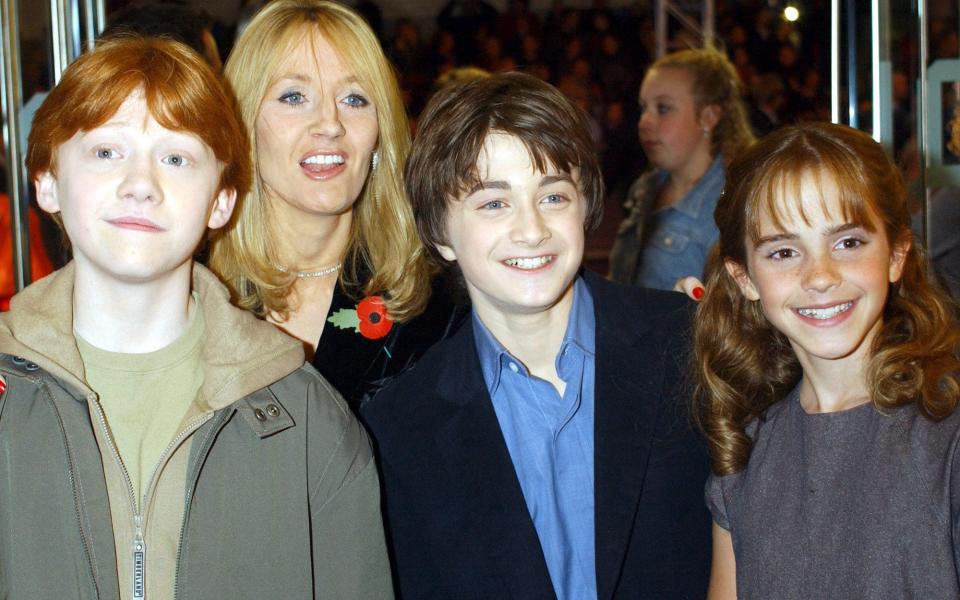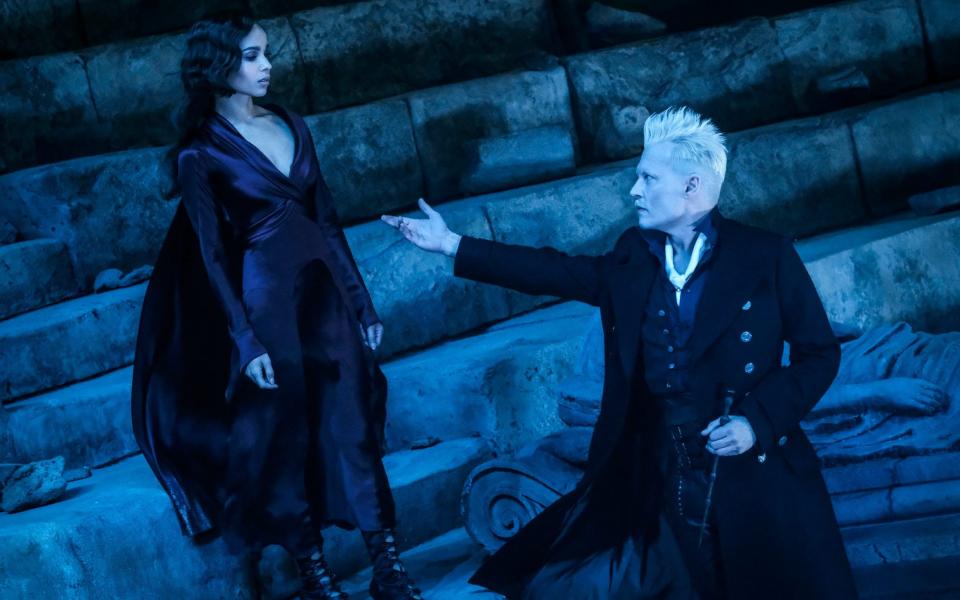JK Rowling, ruiner of childhoods: why 'woke' Harry Potter fans have turned on their idol

The internet has turned into a Rowling inferno after a series of tweets by the creator of Harry Potter were labelled “transphobic”.
“If sex isn’t real, there’s no same-sex attraction,” JK Rowling wrote to her 14.5 million social media followers. "If sex isn’t real, the lived reality of women globally is erased. I know and love trans people, but erasing the concept of sex removes the ability of many to meaningfully discuss their lives. It isn’t hate to speak the truth”.
This was the follow-up to an earlier tweet in which Rowling had rhetorically wondered if there was a word for “people who menstruate”. “I’m sure there used to be a word for those people. Someone help me out. Wumben? Wimpund? Woomud?”
An outcry ensued, with a huge proportion of those weighing in against her belonging to the same millennial generation which came of age reading Harry Potter. Among those taking issue were actresses and activists Sarah Paulson and Jameela Jamil. Paulson approvingly retweeted a description by activist Ben O'Keefe of Rowling as “ complete scum” and which urged her to “shut the f--k up you transphobic f--k”. And Jamil noted Rowling was speaking out in the midst of global Black Lives Matter protests.
“Hey JK as you claim to support trans rights and this is a historical moment where we are globally discussing the impact of white supremacy on Black People, please share some of your $650million mega wealth with this charity.”
Rowling wasn’t taking such comments lying down, however, and accused her critics of misogyny. “‘Feminazi’, ‘TERF’, ‘bitch’, ‘witch’,” she tweeted. “Times change. Woman-hate is eternal.”
Hey JK as you claim to support trans rights and this is a historical moment where we are globally discussing the impact of white supremacy on Black People, please share some of your $650million mega wealth with this charity. https://t.co/3WoGduRuSE
— Jameela Jamil 🌈 (@jameelajamil) June 7, 2020
Nor was she left completely twisting the wind though. Tennis icon Martina Navratilova defended Rowling, tweeting to one of the writer’s critics, “I am sorry if you think speaking up for a level playing field for girls and women in sports is hurtful. What is hurtful is saying to girls and women to just try harder…”
This isn’t the first occasion the Harry Potter author has caught flack for her stance on trans rights. But her opinions have come under greater scrutiny with the surprise announcement last month of new Rowling book for children The Ickabog.
She has already made the first two chapters available for free online. She will add further excerpts ahead of a print version in November. It’s her first non-adult book since Harry Potter and the Deathly Hallows in 2007. And if aimed at a slightly younger age-group than Potter – aged seven to nine is Rowling’s recommendation – it nonetheless marks the return to active service of a titan of children’s literature.
By rights, the Potter-verse should be in a tizzy. Rowling’s news that she was dusting down the story, originally written for her own children over a decade ago, has certainly generated headlines. However, there is little of the mass swooning that greeted each new Potter novel through the early 2000s. Whatever the virtual equivalent of queuing all day for a midnight book launch is, it certainly hasn’t manifested for The Ickabog.

Then, Harry Potter fans are no longer quite the loyal army of yore. For millennials raised on the coming-of-age adventures of Harry, Hermione and Ron Rowling has, at 54, become a complicated and controversial figure.
She loomed throughout their childhoods, and for some she was arguably a defining influence. Harry Potter helped them negotiate the complicated journey into adolescence and out the other side. As Harry muddled his way into adulthood, so did they. But many, though certainly not all, have now turned their backs on Rowling. How has she gone from Hogwarts to Hognoughts so quickly?
One theory is that, by current standards of left-leaning internet discourse, Rowling is insufficiently “woke”. There was an outcry last December when she tweeted her support for Maya Forstater in her case of wrongful dismissal against thinktank Centre for Global Development.
Forstater was accused of tweeting and retweeting dehumanising statements about trans people. Her contract was not renewed and she sued. An employment judge ruled her views were “not worthy of respect in democratic society”. Rowling had by that point already weighed in, tweeting “Dress however you please. Call yourself whatever you like…But force women out of their jobs for stating that sex is real?“
Dress however you please.
Call yourself whatever you like.
Sleep with any consenting adult who’ll have you.
Live your best life in peace and security.
But force women out of their jobs for stating that sex is real? #IStandWithMaya #ThisIsNotADrill— J.K. Rowling (@jk_rowling) December 19, 2019
This went down like a streaker at a Quidditch match. Patricia Arquette, the Hollywood star, tweeted at Rowling: “I am not afraid of being raped by a trans woman in fact I’m afraid FOR trans women as they have the highest likelihood of being raped in any group. I’m afraid of rapist who are -everywhere sadly”.
The sentiments were echoed by Andy Lassner, editor of the Ellen DeGeneres show. He wrote to Rowling, “With all due respect, my guess is Maya will be just fine and doesn’t need anyone to stand with her. Trans folks, however, are among the most vulnerable and marginalised people in the world. I choose to stand with them.”
That was just the start of the palaver. Many Potter fans said their ability to enjoy Rowling’s work had been diminished. A few more or less declared their childhoods retroactively ruined. “Never thought I would say this but here we are…F**k you, J.K,” was the response of one disillusioned Potter partisan.
“She's an aggressive biological essentialist and vocally supports known transphobes and their beliefs,” went a scorching piece in hipster bible, Vice. “It's the latest stage of the slow-burning deepening estrangement between Harry Potter readers and a woman who has often been as ill-suited to the role of pop culture celebrity as she is eager to play it.”
People may agree or disagree over whether Rowling is an “aggressive biological essentialist”. But Vice was absolutely correct about the “slow-burning cultural estrangement” between Rowling and the progressive 20 and 30-somethings who grew up on Potter .

This generational recoil from Rowling has been building quite a while. There was disquiet in 2017 when she defended the casting of Johnny Depp as evil wizard Grindelwald in the second Fantastic Beasts movie, the Crimes of Grindelwald. Depp had been unveiled amid allegations of domestic abuse (which he has consistently denied).
“Based on our understanding of the circumstances,” Rowling wrote “the film-makers and I are not only comfortable sticking with our original casting but genuinely happy to have Johnny playing a major character in the movies.”
She was accused of “straight-washing” and “queer-baiting” in the same film, in which Jude Law was cast as the young Dumbledore. The charge was the Crimes of Grindelwald glossed over Dumbledore’s sexuality, after Rowling had revealed on Twitter in 2007 that he was gay. In an interview for the BluRay release of the Crimes of Grindelwald she elaborated that Law and Depp’s characters had had an “incredibly intense” sexual relationship. Yet none of that was apparent on screen. Tellingly, Crimes of Grindelwald was the lowest grossing Potterverse film to date.
“JK Rowling Confirms Some Characters in Her Books and Movies Are Gay Everywhere Except in the Books or the Movies,” responded critic Eric B Snyder.
“People are rightly taking the p**s out of JK Rowling for her ridiculous post publishing announcements about Dumbledore's sexuality & imaginary sex life,” went another tweet. “Unless there's an editor's note or some gay sex scene she was forced to cut out then she's simply vying for attention”.
With the backlash building, critics began to look more closely at her bibliography. Accusations of transphobia were again levelled over the trans character Pippa in her 2014 Cormoran Strike detective novel, The Silk Worm. According to Vice, “Rowling's narration is consistently othering and patronising towards Pippa as a trans woman”. You can imagine how that went over on social media.
JK Rowling at JK Rowling at
The start of vs. The end of the
The decade Decade pic.twitter.com/Th4ob7x63Z— 𝕝𝕛𝕨𝕣 — Lewis @ 🏡 (@ljwr_) December 19, 2019
She has also annoyed Twitter by incorporating non-Western culture into the Potter-verse. Native American communities accused her of cultural appropriation in 2016 when she repurposed the Navajo legend of “skinwalker” shapeshifters in her online series, History of Magic in North America. Another clamour went up as she invoked the ancient Indonesian demon spirit of the “Naga” in the Crimes of Grindelwald with a character called Nagini.
The issue was the Nagini was portrayed by a Korean actress (Claudia Kim) when the Naga legend had come to Indonesia from India.
“Rowling has not only paid no attention to the fact that her character’s name is of Indic origin,” went a critical piece in the English-language Indian website Scroll.in. “But as a creator, an author, she has also, once again, appointed herself as a supreme authority, forgetting that many of her “creations” owe a huge debt to histories of subjugation that continue to play a role in the “real” world.”
Amid all this, Potter-heads have been re-reading Harry’s escapades in a new light. Offence has been taken over Chinese character "Cho Chang" – which many consider too close to the ethnic slur of Ching Chong for comfort. And there is disquiet over the subservient position of Potter’s elves and the mocking depiction of a “Society for the Promotion of Elfish Welfare”. There were mutterings of anti-semitism, too, around her the goblin banking dynasty, the Gringotts.
if you liked grateful slaves & hooknosed banking goblins you’ll love harry potter and the biological essentialism of gender https://t.co/59Glxwppir
— Talia Lavin (@chick_in_kiev) December 19, 2019
Her age has also become a factor. When in 2018 Rowling “liked” a tweet accusing trans women of being “men in dresses” her publicist dismissed it as “a middle aged” moment – which apparently meant that she clicked by accident. She has also predictably been labelled a “Karen” – a social media caricature of white middle-class women as privileged and prejudiced.
Whether or not “Karen” is sexist or ageist is a debate for another time. Still, it’s hard to look past the fact that when people object to something that, for instance, Stephen King has tweeted, their comments are directed at the substance of what he is saying, not at King himself. He isn’t attacked for his age or gender. By contrast, you will read tweets wondering whether the “K” in Rowling “stands for Karen”.
The backlash against Rowling is clearly coloured by anger and a deeply-felt sense of betrayal. As already pointed out, for millennials, Rowling and her writing are bound up in the fabric of their formative years. Much of what they learned about the world and about growing up was gleaned from Harry Potter and his adventures.
Now, in adulthood, they have discovered that the person who gave them Harry is not some font of infinite wisdom but an ordinary person with opinions with which they may or may not agree. Can they ever forgive Rowling for being a middle-aged woman with feet of clay?

 Yahoo Movies
Yahoo Movies 